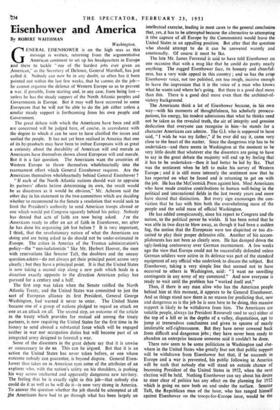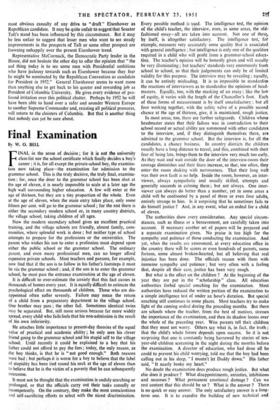Eisenhower and America
By ROBERT WAITHMAN
Washington.
GENERAL EISENHOWER is on the high seas as this message is written, returning from the argumentative American continent to set up his headquarters in Europe and there to tackle " one of the hardest jobs ever given an American," as the Secretary of Defence, General Marshall, has just called it. Nobody can now be in any doubt, so often has it been pointed out within the last few weeks, that he cannot do the job— he cannot organise the defence of Western Europe so as to prevent a war, if possible, from starting and, in any case, from being lost— unless he has the steady support of the North Atlantic peoples and Governments in Europe. But it may well have occurred to some Europeans that he will not' be able to do the job either unless a similar steady support is forthcoming from his own people and Government.
The great debate with which the Americans have been and still
are concerned will be judged here, of course, in accordance with the degree to which it can be seen to have clarified the issues and unified the people. It has not yet been realised in America that one of its by-products may have been to imbue Europeans with as great a curiosity about the durability of American will and morale as Americans have themselves shown about European will and morale. But it is a fair question. The Americans want the countries of Western Europe to throw themselves wholeheartedly into the
rearmament effort which General Eisenhower requires. Are the Americans themselves wholeheartedly behind General Eisenhower ?
" If each of the North Atlantic nations should wait to appraise its partners' efforts before determining its own, the result would be as disastrous as it would be obvious," Mr. Acheson said the other day in his statement to the two committees which are deciding whether to recommend to the Senate a resolution that would seek to limit the President's authority to send American troops abroad or one which would put Congress squarely behind his policy. Nobody
has denied that acts of faith are now being asked. 1 re the
• Americans ready to offer an act of faith in Eisenhower, not after he has done his organising job but before ? It is very important, I think, that the revolutionary nature of what the Americans are .doing and are being asked to do should not be under-estimated in Europe. The critics in America of the Truman administration's policy—the " neo-isolationists " like Mr. Herbert Hoover, the men with reservations like Senator Taft, the doubters and the uneasy question-askers—do not always get their principal point across very clearly ; but they have a principal point. It is that the United States is now taking a second step along a new path which leads in a direction exactly opposite to the direction American policy has pursued for a century and a half.
The first step was taken when the Senate ratified the North Atlantic Treaty, and the United States was committed to just the sort of European alliance its first President, General George Washington, had warned it never to enter. The United States became one of a group of nations pledged to regard an attack on one as an attack on all. The second step, an outcome of the article in the treaty which provides for mutual aid among the treaty partners, is now requiring the United States for the first time in its history to send abroad a substantial force which will be engaged neither in war nor occupation duties but will become part of an integrated army designed to forestall a war.
Some of the dissenters in the great debate say that it is unwise or unnecessary to do so. This can be argued. But that it is an action the United States has never taken before, or one whose outcome nobody can guarantee, is beyond dispute. General Eisen- hower thus takes on in American eyes some of the attributes of an explorer who, with the nation's safety on his shoulders, is pushing his way across uncharted and apparently dangerous new territory. The feeling that he is exactly right in this job—that nobody else could do it as well as he will do it—is now very strong in America. To answer the question whether the job should be attempted at all • the Americans have had to go through what has been largely an intellectual exercise, leading in most cases to the general conclusion that, yes, it has to be attempted because the alternative to attempting
it (the capture of all Europe by the Communists) would leave the United States in an appalling position_ But after that the question who should attempt to do it can be answered warmly and emotionally. Of course it must be Ike.
The late Mr. James Forrestal is said to have told Eisenhower on one occasion that with a mug like that he could do pretty nearly
anything. The rugged Eisenhower face, its honesty and cheerful- ness, has a very wide appeal in this country ; and so has the crisp Eisenhower voice, not too polished, not too rough, incisive enough
to leave the impression that it is the voice of a man who knows what he wants and where he's going. But there is a good deal more than this. There is a good deal more even than the architect-of- victory background.
The Americans think a lot of Eisenhower because, in his own way—with his moments of thoughtfulness, his scholarly preoccu- pations, his energy, his modest admissions that what he thinks need not be taken as the revealed truth, the air of integrity and genuine dedication that everyone can recognise in him—he stands for a character Americans can admire. The G.1. who is supposed to have said, " I wish he was my father," if he ever did say it, came very close to the heart of the matter. Since the dangerous trip has to be undertaken—and there seems in Washington at the moment to be very little doubt that whatever else the dissenters are going to have to say in the great debate the majority will end tip by feeling that it has to be undertaken—then it had better be led by Ike. That was the sentiment when he left to make his survey of Western Europe ; and it is still more intensely the sentiment now that he has reported on what he found and is returning to get on with the job. He has the McCormick Press against him. Most Americans who have made creative contributions to human well-being in the political and international fields in the last twenty years and more have shared that distinction. But every sign encourages the con- viction that he has with him both the overwhelming mass of the people and the solid mass of official Washington.
He has added conspicuously, since his report to Congress and the nation, to the political power he wields. It has been noted that he was able in two days to blow away, as though it had been a sudden fog, the notion that the Europeans were too dispirited or too dis- united to play their proper defensive Kole. Another of his accom- plishments has not been so clearly seen. He has damped down the ugly-looking controversy over German rearmament. A few weeks ago the view that Europe could not be successfully defended unless German soldiers were active in its defence was part of the standard equipment of any official who undertook to discuss the subject. But Eisenhower, taking a very simple line that seemed not to have occurred to others in Washington, said: "I want no unwilling contingents in any army of my command." And now everyone is ready to wait until the problem has " worked itself out."
Thus, if there is any man alive who has the American people behind him at this moment, it appears to be General Eisenhower. And as things stand now there is no reason for predicting that, new and dangerous as is the job he is seen here to be doing, this massive support is likely to be withdrawn from him. The Americans are volatile people, always (as President Roosevelt used to say) either at the top of a hill or in the depths of a valley, disputatious, apt to jump at tremendous conclusions and given to spasms of nearly intolerable self-righteousness. But they have never cowered back from difficult and dangerous jobs ; they have never been ready to abandon an enterprise because someone said it couldn't be done.
There now seem to be some politicians in Washington and else- where in the United States who greatly fear not that public support will be withdrawn from Eisenhower but that, if he succeeds in Europe and a war is prevented, his public following in America will be such that nobody else will stand an outside chance of becoming President of the United Slates in 1952, when the next election will be held. Nothing Eisenhower can say about his desire to steer clear of politics has any effect on the planning for 1952 which is going on now both on and under the surface. Senator Taft, the Republican man of the hour, who has ranged himself against Eisenhower on the troops-for-Europe issue, would be the
most obvious casualty of any drive to "draft" Eisenhower as Republican candidate. It may be quite unfair to suggest that Senator Taft's stand has been influenced by this circumstance. But it may be less unfair to suggest that lesser men who want to see steady improvements in the prospects of Taft or some other prospect are frowning unhappily over the present Eisenhower trend.
Representative McCormack, the Democratic Party leader in the House, did not hesitate the other day to offer the opinion that " the sad thing today is to see some men with Presidential ambitions who have jealousy towards such as Eisenhower because they fear he might be nominated by the Republican Convention as candidate for President in 1952." General Eisenhower seems to want more than anything else to get back to his quieter and rewarding job as President of Columbia University. He gives every evidence of pro- found irritation over this political chatter. Perhaps by 1952 he will have been able to hand over a safer and sounder Western Europe to another Supreme Commander and, resisting all political pressures, will return to the cloisters of Columbia. But that is another thing that nobody can yet be sure about.







































 Previous page
Previous page